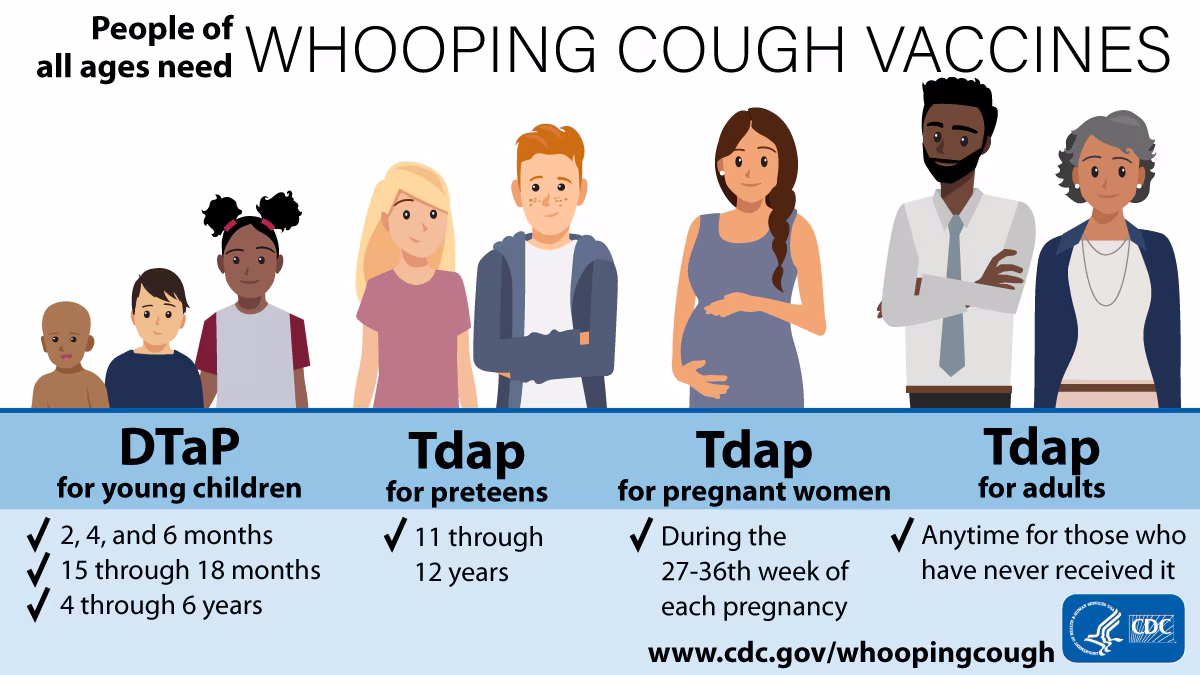Pertussis
Whooping cough (pertussis) is a respiratory illness caused by a type of bacteria called Bordetella pertussis. The disease is only found in humans.
Whooping cough bacteria attach to the cilia (tiny, hair-like extensions) that line part of the upper respiratory system. The bacteria release toxins (poisons), which damage the cilia and cause airways to swell.
2025 trends
For the week ending on Dec. 27, 2025, Oklahoma has had 429 reported cases of pertussis in 2025. The number of reported whooping cough cases is higher than what was seen at this time last year. The United States is beginning to return to pre-pandemic patterns where more than 10,000 cases are typically reported each year, according to the CDC.
Early symptoms
It usually takes 5 to 10 days for symptoms to appear after exposure to the bacteria that cause whooping cough. Sometimes symptoms don't develop for as long as 3 weeks.
Appears like a common cold
Whooping cough appears similar to a common cold early on. Healthcare providers often don't suspect or diagnose it until more severe symptoms appear.
Early symptoms can last for 1 to 2 weeks and usually include:
- Runny or stuffed-up nose
- Low-grade fever (less than 100.4°F)
- Mild, occasional cough
Later symptoms
Rapid, violent, and uncontrolled coughing fits
One to 2 weeks after the first symptoms start, people may develop paroxysms, known
as coughing fits. These coughing fits usually last 1 to 6 weeks but can last for up
to 10 weeks. The cough generally gets worse and becomes more common as the illness
continues.
Coughing fits can cause people to
- Make a high-pitched "whoop" when they inhale after a coughing fit
- Vomit during or after coughing fits
- Feel very tired after the fit, but usually seem well in-between fits
- Have difficulty sleeping at night
- Struggle to breathe
- Fracture (break) a rib
Treatment
Healthcare providers generally treat whooping cough with antibiotics. There are several antibiotics available for treatment.
It's very important to treat whooping cough early, before coughing fits begin.
Treating whooping cough early can
- Make the illness less serious
- Help prevent spreading the bacteria that cause it to others
Starting treatment after three weeks of illness is unlikely to help even though most people will still have symptoms. By then, the infection is gone (the bacteria aren't in the body any longer). The ongoing symptoms are because the airways were damaged and take time to fully heal.
According to the CDC, teens and adults could have complications, like pneumonia, from whooping cough. Complications are usually less serious in this age group, especially in those who have been vaccinated against whooping cough.
Vaccination
There are 2 types of combination vaccines that include protection against whooping cough:
- DTaP
- Tdap
The letter "T" in DTaP and Tdap shows they also help protect against tetanus. The letter "D/d" in DTaP and Tdap shows they also help protect against diphtheria. The letter "p" in DTaP and Tdap shows they also help protect against pertussis.
For an overview of the whooping cough vaccination, visit the CDC.

